Did you know that your longevity is only about 25% attributable to genetics? As it turns out, your lifestyle choices, including your diet, can play a massive role in how long you live. Residents of the “Blue Zones”—which include Okinawa, Sardinia, Nicoya, Icaria, and Loma Linda—are well aware of this. Because of their healthy eating habits, they have a larger population of centenarians (people over 100) than anywhere else in the world.
“Following the Blue Zones’ eating habits is a centuries-old proven method to promote longevity, connection, and energy,” says Lexi Endicott, RD and culinary nutrition specialist at To Taste Culinary Nutrition. “You can start adopting these eating principles at 2 or 92; it’s never too early or too late to make food choices that promote your long-term health. Not only do the Blue Zones eating principles help you live a longer, healthier life, but they also naturally promote a longer, healthier life for our planet, too—a double win!”
Just as you can take a cue from Blue Zone residents on what to eat, you can also take a cue from them on what not to eat. Below, registered dietitians share a few eating habits you’ll want to skip if you want to live a longer life.
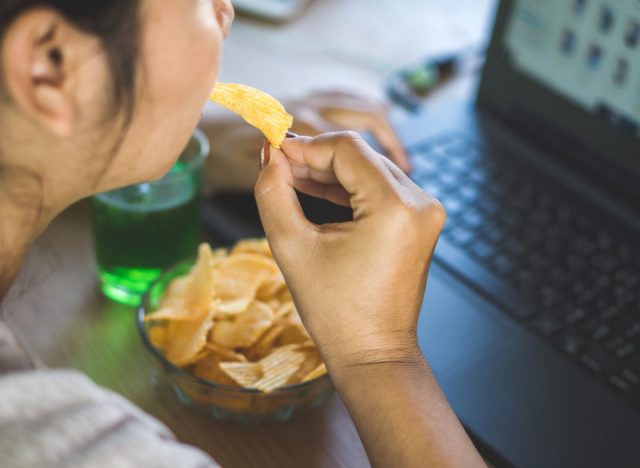

It’s all too easy to go overboard on the snacks when you’re bored or distracted. For instance, if you’re watching Netflix or working at your desk and eating straight out of the bag or box, you may find that you frequently eat way more than one portion size.
“When you eat mindlessly, you are more likely to overeat, and you likely will not enjoy your food as much as you could have,” says Endicott. “In one of the Blue Zones—Okinawa, Japan—they have a practice called Hara Hachi Bu, which translates to ‘eat until you are 80% full.’ Saying this phrase before each meal reminds them to not eat too much, which allows Okinawans to tap into their body’s hunger and fullness signals. This strategy can help you, too: eating enough but not too much can keep you nourished while staving off excess pounds.”
If it helps, you may want to pre-portion out snacks to avoid mindless munching.
“Overeating can lead to obesity and further aggravate chronic conditions,” adds Blanca Garcia, RDN, a nutrition specialist for Health Canal.
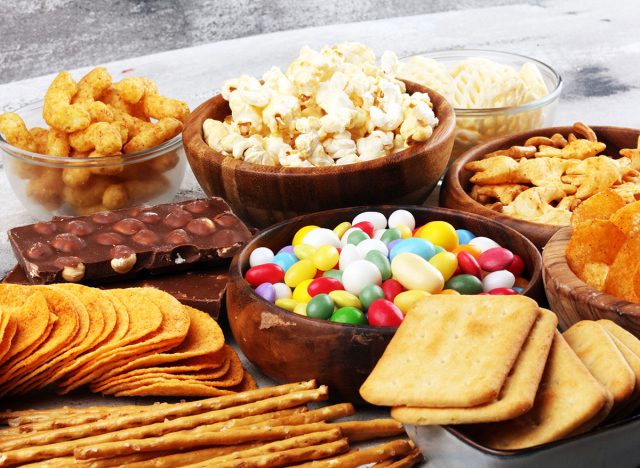

Processed foods are unhealthy in not one, but two ways: they tend to be loaded with excess sugar, salt, fat, calories, and other additives, and also lacking in essential vitamins, minerals, protein, fiber, water, and phytonutrients.
“High ultra-processed food intake is consistently correlated with increased risk of overweight, obesity, metabolic disorder, cancer, type-2 diabetes, cardiovascular diseases, irritable bowel syndrome, depression, and all-cause mortality,” explains Endicott. “Blue Zones residents focus on whole, natural foods that promote satiety and are packed with disease-fighting vitamins, minerals, fiber, and phytonutrients.”
Trista Best, RD at Balance One Supplements adds that some of the worst options you can have are processed meats (bacon, pepperoni, hot dogs, etc.), salty processed snacks, sugar-sweetened beverages, and packaged sweets.
“Packaged sweets should be avoided because they contain refined carbohydrates which are inflammatory, this can dull the immune system and is detrimental to gut health,” she explains. “Salty snacks contain preservatives and salt which increase the risk of other metabolic conditions like hypertension and cholesterol. And processed meats are off-limits due to their link to cancer and heart disease risks.”
READ RELATED: Philadelphia to require masks in schools once again
According to Dana Ellis Hunnes, RD—a senior dietitian at UCLA medical center and author of Recipe For Survival—avoiding these foods can support longevity by lowering inflammation, a well-known predictor of chronic disease and early death.
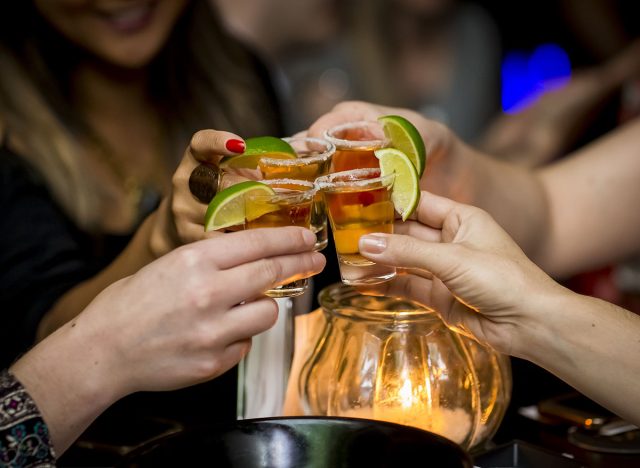

It’s not that Blue Zoners don’t drink—it’s that they do so in moderation, and they stick with polyphenol-rich wine. For example, Sardinians often enjoy a glass of Cannonau red wine with a meal. Dry reds are an excellent choice because they’re low in sugar and high in antioxidants.
In fact, a 2006 study in Nature found that reds from Sardinia and southwestern France are naturally higher in procyanidins, a type of antioxidant that’s been linked to promoting heart health. Chardonnay, Riesling, and sauvignon blanc are a few white wines with the highest antioxidant levels.
“If Blue Zone residents drink at all, it’s typically just one drink a day, and socially—not to be drunk,” explains Hunnes. “Alcohol is associated with increased risk of certain cancers, like breast and liver cancer, and early death.”
Remember: the 2020–2025 Dietary Guidelines for Americans recommends limiting alcohol intake to two drinks or less in a day for men and one drink or less in a day for women in order to prevent the health risks associated with alcohol.
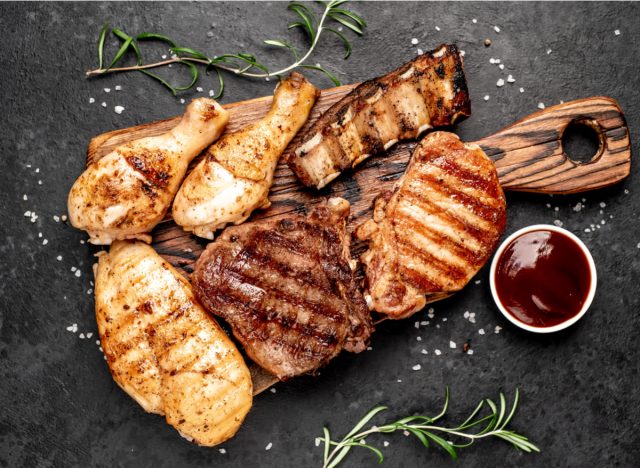

You don’t necessarily have to go vegetarian to live a long life—in fact, many Blue Zone residents still occasionally enjoy meat, fish, eggs, and dairy in their diets. That said, according to Endicott, the vast majority of their nutrients come from plant-based foods. Blue Zone residents typically only eat about two ounces of meat five times per month, about three ounces three times per week, and about two to four eggs per week.
“They do not consume animal foods in the same way that most Americans do,” she explains. “They consume them in smaller quantities alongside lots of other plant foods. By limiting their animal protein intake, they naturally avoid excess calories, saturated fat, and other potentially carcinogenic compounds.”
Rather than getting all of your protein from animal-based products, Garcia advises leaning into protein-rich beans, lentils, whole grains, vegetables, nuts, and seeds.
“By increasing plant-based protein you include healthy unsaturated fats, vitamins, minerals, and cholesterol-free protein,” she adds.
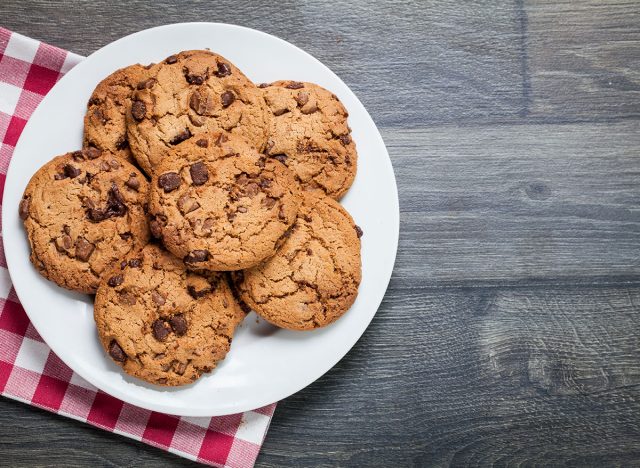

Like meat, Blue Zone residents usually reserve sweets for special occasions and celebrations. They don’t eat many foods with added sweeteners and overall only consume around seven teaspoons of sugar per day. The average American consumes more than double that—about 17 teaspoons per day.
Regularly consuming excess sugar can shorten your lifespan by increasing your risk of type 2 diabetes, heart disease, and obesity. such as weight gain and obesity And added sugar isn’t just in the obvious foods like cookies and candy—it’s also hiding in many other unexpected foods like yogurts, cereals, smoothies, condiments, and even salad dressings. Make it a point to always check the nutrition label on processed foods to confirm the sugar content, and try not to exceed a max of 12 teaspoons per day. When you’re craving dessert, do like the Blue Zoners do and enjoy some fresh fiber-rich fruit, which will fill you up while satisfying that sweet tooth.
Source:









